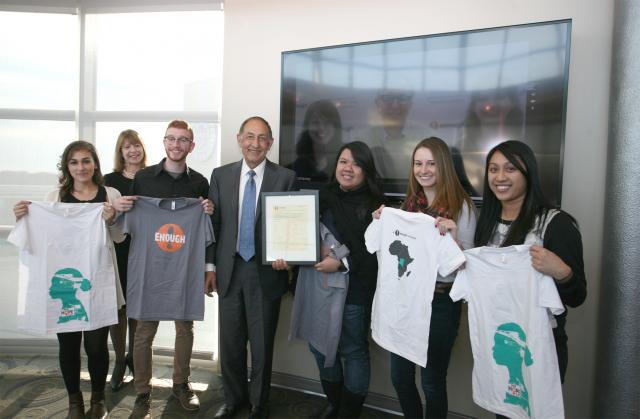Kean Goes Conflict-Free

Student-activists at Kean University are in high spirits following a unanimous vote by the University's Board of Trustees to pass a resolution in support of a “conflict-free” purchasing process for electronics, making Kean the first university in New Jersey to adopt a conflict-free purchasing policy. The resolution authorizes Kean University, when making future school-wide purchasing decisions, to review a company’s disclosure regarding the minerals used in their electronic products and, when available, to favor products that are verified as not contributing to the ongoing violence in the mining sector of the Democratic Republic of Congo.
“Each year, conflict minerals such as gold, tin, tantalum and tungsten are pillaged from the Congo by armed groups who generate hundreds of millions of dollars for themselves, not the Congolese citizens,” said Kaitlin Mays ’16 M.A., a recent graduate from Kean’s Master of Arts in Holocaust and Genocide Studies program who took a special interest in the project from its inception to the recent resolution adoption. “In turn, the Congolese citizens are suffering. This conflict-free resolution shows that companies and their consumers, including Kean University, are aware of the plight of the Congolese and are dedicated to doing their part to combat human rights abuses and promote social justice.”
Mays is among the students affiliated with Kean’s Human Rights Institute who first learned of the international Conflict-Free Campus Initiative (CFCI) in spring of 2016 from activist John Prendergast, the University’s Anne Evans Estabrook Senior Human Rights Fellow and founding director of the Enough Project.
“Kean’s students were instantly called to action,” said Janice Kroposky, CFCI advisor and director of the Holocaust Resource Center and Diversity Council at Kean. “They researched the issue, developed a plan and created presentations to explain why the University should become part of the movement to hold all stakeholders in the supply chain responsible for mineral acquisition and use.”
Prendergast says Kean University’s Board of Trustees has joined a growing chorus of human rights activists demanding greater corporate social responsibility.
“As the Senior Human Rights Fellow at Kean, I am excited and proud that the University has taken this crucial step to support peace in the Democratic Republic of Congo and transparency in global supply chains,” he said. “By wielding the significant consumer power of the University collectively, and encouraging students and faculty to do so on an individual level, Kean has demonstrated its commitment to upholding human rights worldwide.”
CFCI aligns with the mission of Kean’s Human Rights Institute to promote the awareness of human rights issues and violations worldwide, and to develop initiatives designed to help eradicate these atrocities and their root causes. More than 25 schools across the U.S. and internationally have passed resolutions similar to Kean's recent conflict-free policy as part of the initiative.
“Our students want to contribute to a better world, and we offer them opportunities to do so as a cornerstone of their world-class university experience,” said Kean President Dawood Farahi, Ph.D. “This new conflict-free resolution is the latest example of how the campus community continually answers the call to action to make meaningful improvements in the world in which we live.”
The resolution continues a longstanding partnership between the University and Prendergast. In 2014, Kean design students created ads for The Enough Project’s #CongoGold effort, encouraging jewelers and jewelry-buyers to stay away from illegally mined and smuggled Congolese gold that the organization says funds a variety of violent acts.
Conflict minerals - tin, tungsten, tantalum (the '3Ts') and gold - have fueled and continue to help sustain armed violence in eastern Congo, linking them to the deadliest conflict globally since World War II, with more than 5.4 million people dead. These minerals are used in a variety of consumer products, most prominently in electronics including cell phones and laptops. Through consistent consumer activism like the Conflict-Free Campus Initiative, companies have begun to conduct due diligence on their supply chains to ensure their products are not funding illegal armed groups which are responsible for ongoing murders, child abductions and sexual violence in Congo. More information about conflict minerals can be found online at the Enough Project: http://enoughproject.org/special-topics/progress-and-challenges-conflict...
PHOTO/CAPTION: Kean University President Dr. Dawood Farahi (center) and Professor Robin Landa (second from left) with Kean University student designers who worked with The Enough Project to create ads for their #ConflictGold campaign with Rachel Finn, Greg Hittelman and Annie Calloway, members of the Enough team joining via teleconference.